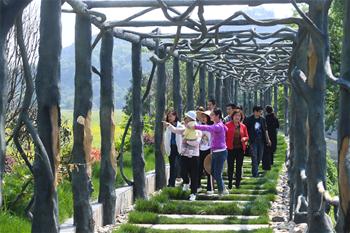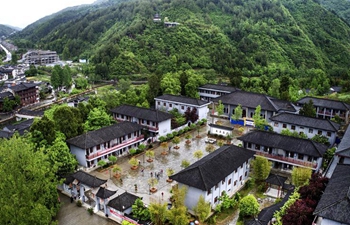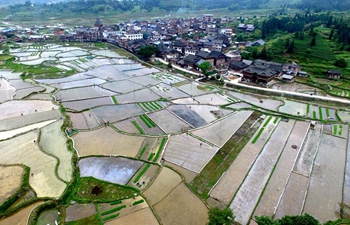CHENGDU, April 26 (Xinhua) -- Known as the preferred diet of the giant panda, bamboo is now sprouting as an important plant to help the impoverished shake off poverty in southwest China.
Fang Yongqi dropped out of school when he was 14 because his family couldn't afford tuition fees. He had to learn to carve bamboo roots to make a living. Although surrounded by bamboo forests, neither he nor other villagers fully realized the value of bamboo.
As more tourists come to see the beautiful scenery of the bamboo forests, Fang can now earned more than one million yuan (158,000 U.S. dollars) by selling his bamboo work every year.
In Baijie Town, villagers cultivate bamboo fungus, or crinoline stinkhorn, a delicacy in some Asian countries, which grows in well-rotted bamboo.
Long Chaogui, 49, once a migrant worker, decided to stay in the village and develop his own bamboo business.
In the eyes of Long, bamboo is the "golden key" to change his hard life. He sold bamboo and bamboo shoots at first, and finally grew bamboo fungus, which brought him more than 400,000 yuan last year. Long is now planning to expand his business this year.
Since there is a high demand for this kind of mushroom, other villagers have followed suit to develop bamboo-related business.
The bamboo have also attracted businesses to Sichuan. Bamboo has been developed as a raw material to produce paper, charcoal, wine and fiber products. Those products increase employment and incomes for local residents.
"With the largest area of bamboo forests of any province, the bamboo industry has become a pillar industry in some regions of Sichuan. Total output has reached one billion yuan," said Ma Ping, an official with the provincial forestry department.
There are more than 1.16 million hectares of commercial bamboo plantations in the province, which is also the habitat of nearly 1,800 giant pandas.
Chen Yingjun, a farmer in Wolong Town in southwest China's Sichuan Province, used to grow potato and corn, but his life has greatly improved since he started to grow bamboo for giant pandas.
Chen signed an agreement with the local government to grow bamboo on his farm for giant pandas.
He successfully got rid of poverty, while other farmers from more than 3,000 households in this town have also joined the government-led project. More impoverished people are expected to be lifted out of poverty in the coming years.

















